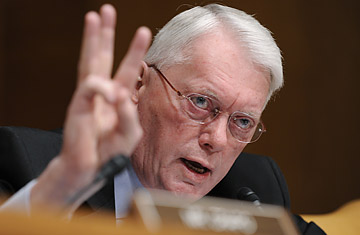
Senate Budget Committee member Sen. Jim Bunning, R-Ky. asks a question of Federal Reserve Chairman Ben Bernanke, not shown, during his testimony before the committee, Tuesday, March 3, 2009, on Capitol Hill in Washington.
It was only four years ago that Sen. Jim Bunning of Kentucky stood in front of a buoyant crowd of victorious Republicans at a Lincoln Day dinner in Louisville and broke down in tears about his friend Mitch McConnell. "I hope everybody here understands how much he stuck his neck out for me through thick and thin during that race last year," Bunning, 77, said pointing to Kentucky's senior senator, the number two Senate Republican at the time and the key architect of the GOP's astonishing ascendancy in the state over the previous decade. McConnell, 67, had indeed spent much of the final weeks of Bunning's 2004 re-election campaign on a tour bus, telling crowds across the Bluegrass State that Kentucky, and America, needed Jim Bunning in the Senate.
The race was one of the closest, costliest, and nastiest for Senate in Kentucky history, and Bunning ultimately only won a second term with less than 51% of the votes.
During the campaign the famously irascible Hall of Fame pitcher had endured repeated questions about his age and even his mental stability, and had stood by while supporters called his opponent limp-wristed. Always prone to outlandish statements, Bunning himself made news when he said his opponent Daniel Mongiardo, then a state senator and now a lieutenant governor expected to run for the seat in 2010, looked like "one of Saddam Hussein's sons." In 2006, TIME named Bunning one of America's worst senators. (See America's best and worst senators.)
But in the four years since that triumphant, emotional dinner, everything has changed for Republicans, both in Washington and Kentucky — and that includes the relationship between Bunning and McConnell, which is visibly strained. Now the minority leader in the Senate, McConnell knows that Democrats will likely be just one seat away from a filibuster-proof 60 seats by the midterm elections of 2010, and Bunning is an especially vulnerable incumbent. Louisville, the city where Bunning praised McConnell four years ago, now has a liberal Democrat in the House, and the Republican governor McConnell helped elect in 2003 was turned out in a rout in 2007. "For McConnell this is a matter of doing what's right, though for others it might be seen as doing what's politically advantageous," Al Cross, the dean of political commentators in Kentucky and the director of the Institute for Rural Jounalism at the University of Kentucky, told TIME. "But he is not going to let friendship get in the way here. His job is to see that a Republican gets re-elected." (See the top 10 unfortunate political one-liners.)
The cracks in the relationship began to show in January, when McConnell — fresh off his own surprisingly tough re-election battle — told the National Press Club that he would wait to comment on the 2010 race until Bunning "had made his intentions clear." That prompted a furious response from Bunning, who suggested McConnell has either lost his memory or his honesty. "He knew very well what my intentions are," he said in a conference call with reporters the next day.
Since then Bunning has found himself even more isolated. Party leaders in Washington met with a potential primary opponent, David Williams, a McConnell ally who is the whip-smart and baldly partisan president of the Kentucky senate. Last month, Bunning called Sen. John Cornyn of Texas, who will lead efforts to re-elect GOP senators in 2010, a liar after Cornyn denied he was recruiting an alternative candidate to Bunning. Just for good measure, he also threatened to sue the party if they did indeed recruit a candidate to run against Bunning.
